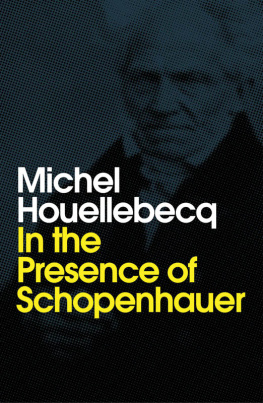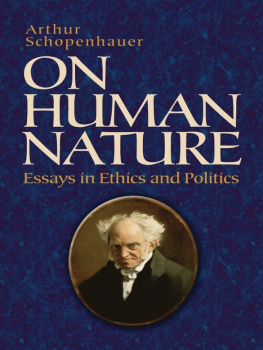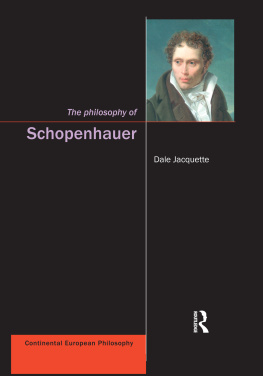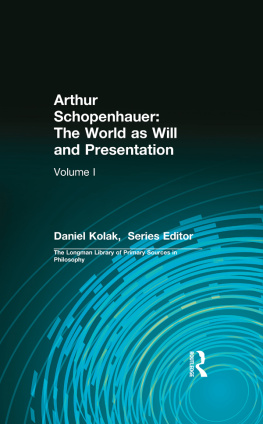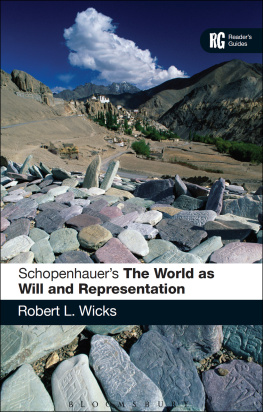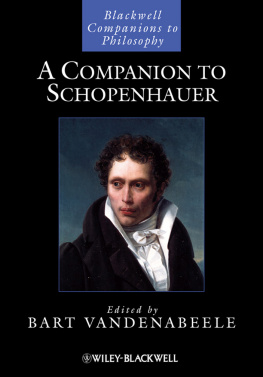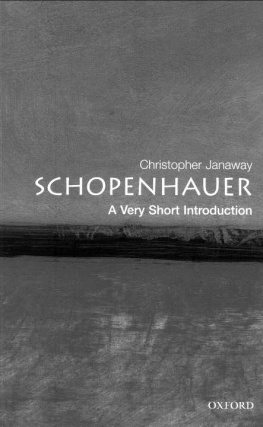Schopenhauer
'This is a comprehensive, sensible and lucidly presented account of Schopenhauer's philosophy. The author succeeds in showing why Schopenhauer still deserves to be studied, but at the same time he is appropriately critical when discussing Schopenhauer's doctrines and arguments.'
Severin Schroeder, University of Oxford, UK
Routledge Philosophers
Edited by Brian Leiter
University of Texas, Austin
Routledge Philosophers is a major series of introductions to the great Western philosophers. Each book places a major philosopher or thinker in historical context, explains and assesses their key arguments, and considers their legacy. Additional features include a chronology of major dates and events, chapter summaries, annotated suggestions for further reading and a glossary of technical terms.
An ideal starting-point for those new to philosophy, they are also essential reading for those interested in the subject at any level.
Hobbes A. P. Martinich
Leibniz Nicholas Jolley
Locke E. J. Lowe
Hegel Frederick Beiser
Rousseau Nicholas Dent
Schopenhauer Julian Young
Freud Jonathan Lear
Forthcoming:
Spinoza Michael Della Rocca
Hume Don Garrett
Kant Paul Guyer
Fichte and Schelling Sebastian Gardner
Husserl David Woodruff Smith
Rawls Samuel Freeman
Schopenhauer
Julian Young
LONDON AND NEW YORK
First published 2005
2 Park Square, Milton Park, Abingdon, Oxon OX14 4RN
Simultaneously published in the USA and Canada
by Routledge
270 Madison Ave, New York, NY 10016
Routledge is an imprint of the Taylor & Francis Group
This edition published in the Taylor & Francis e-Library, 2005.
To purchase your own copy of this or any of Taylor & Francis or Routledges collection of thousands of eBooks please go to www.eBookstore.tandf.co.uk.
2005 Julian Young
All rights reserved. No part of this book may be reprinted or
reproduced or utilised in any form or by any electronic,
mechanical, or other means, now known or hereafter
invented, including photocopying and recording, or in any
information storage or retrieval system, without permission in
writing from the publishers.
British Library Cataloguing in Publication Data
A catalogue record for this book is available from the British Library
Library of Congress Cataloging in Publication Data
Young, Julian.
Schopenhauer / Julian Young.1st ed.
p. cm.(The Routledge philosophers)
1. Schopenhauer, Arthur, 17881860. I. Title. II. Series
B3148.Y67 2005
193dc22 2004017644
ISBN 0-203-02210-6 Master e-book ISBN
ISBN 0-415-33346-6 (hbk)
ISBN 0-415-33347-4 (pbk)
Copyright 2004/2005 . All rights reserved.
Reader's Guide
This ebook has been optimized for PDA.
Tables may have been presented to accommodate this Device's Limitations.
Table content may have been removed due to this Device's Limitations.
Image presentation is limited by this Device's Screen resolution.
All possible language characters have been included within the Font handling ability of this Device.
For
Mary Montgomery
Contents
Acknowledgements
I should like to thank those who took part in my Auckland graduate seminar in the first semester of 2003 for a stimulating discussion of the substance of this book: in particular, Brignal Woods, Melanie Dougan, Tim MacKenzie and Mathias Mickl. Thanks are also due to my editor, Tony Bruce, and to the Routledge Philosophers series editor, Brian Leiter, for useful suggestions as to the structure of the work. The two (anonymous) readers of the manuscript saved me from various errors.
I am grateful, too, to the Deutscher Akademischer Austauschdienst and to the University of Auckland for research grants which enabled me to visit the Schopenhauer Archive in Frankfurt am Main and to benefit from discussions with German colleagues in Bonn and Lneburg.
Finally I should like to thank Gnter Seubold and Christoph Jamme for those helpful and enjoyable discussions.
Abbreviations
The World as Will and Representation, vols I and IIWR I, WR II
The Fourfold Root of the Principle of Sufficient Reason FR
On the Will in Nature WN
On the Basis of Morality BM
On the Freedom of the WillFW
Parerga and Paralipomena vols I and IIPP I, PP II
Manuscript Remains vols IIVMR 14
Chronology
1632
Spinoza born (dies 1677)
Locke born (dies 1704)
1685
Berkeley born (dies 1753)
1717
Hume born (dies 1776)
1724
Kant born (dies 1804)
1749
Goethe born (dies 1832)
1762
Fichte born (dies 1814)
1770
Hegel born (dies 1831)
1775
Schelling born (dies 1854)
1781
Kant's Critique of Pure Reason appears.
1788
Arthur Schopenhauer is born.
1793
The Schopenhauer family move to Hamburg.
1797
Schopenhauer travels to Paris and Le Havre with his father.
Stays two years in Le Havre with family of business associate of his father
18034
Grand tour of Holland, England, France, Switzerland, Austria.
1804
Apprenticed to merchant Kabrun in Danzig.
1805
Apprenticed to merchant Jenisch in Hamburg.
Apparent suicide of his father.
1806
Mother moves to Weimar. Goethe starts to visit her tea parties.
1807
Studies at grammar school in Gotha to obtain university entrance.
180911
University studies at Gttingen: natural science, Plato, Kant.
181113
University studies in Berlin. Attends lectures by Fichte, Schleiermacher, Wolf.
1813
Flees Berlin on account of war. Short stay in Weimar.
Quarrels with mother, moves to nearby Rudolstadt where he writes his Ph. D. dissertation On the Fourfold Root of the Principle of Sufficient Reason. Conversation with Goethe in mother's house concerning theory of colours.
Richard Wagner born (dies 1883).
1814
Schopenhauer's final break with mother. Leaves Weimar for Dresden.
1815
On Seeing and Colours. Draft of first version of World as Will and Representation.
1818
World as Will and Representation published (though with '1819' on title page). Leaves Dresden for Italy.
1820
Lectures in Berlin. Hardly anyone turns up.
1821
Falls in love with singer Caroline Mdon. Beginning of the 'Marquet affair' (assault on seamstress and suit fordamages).
182333
Lives in Italy, Munich, Frankfurt, Mannheim, Dresden, Bad Gastein and Berlin. Tries and fails to establish himself as a translator. Illness, depression.
1833
Settles in Frankfurt, where he remains until the end of his life.
1835
Next page



